Making a difference is at the heart of Saint Theodora winners' approach to teaching
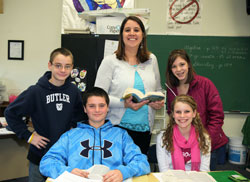
Five teachers from across the archdiocese were recently recognized as winners of the Saint Theodora Excellence in Education Award. Lisa Vogel, above, the eighth-grade teacher at St. Mary School in North Vernon, says her main focus when teaching students is to be a Christian by the love that she shows others. She is pictured with students, seated, from left, Trace Sporleder and Taylor AmRhein. Standing are Kobe Eder, Vogel and Stefani Williams. (Submitted photo)
By John Shaughnessy
Nearly everyone knows or remembers a teacher whose care and influence made a difference in their life.
Sometimes the difference comes when a student is unsure, scared or even crying—and the teacher is there to reassure, encourage and wipe away the tears.
Other times, the difference comes from a teacher who sets high standards for his or her students—and then watches the students go from grumbling about those "impossible" expectations to taking pride in reaching them or surpassing them.
Then there are the times when a teacher lets a student try something different or a teacher realizes that he or she has to try something different to reach the students—all in the hope of helping them understand the material and maybe even inspire them to believe in themselves and the possibilities of their lives.
Those difference-making qualities are evident in the five teachers from across the archdiocese who were honored on March 1 as the winners of the 2011-12 Saint Theodora Excellence in Education Award by the archdiocesan Office of Catholic Education—Vicki Auger, Mary Briscoe, Stephen Buell, Patricia Musgrave and Lisa Vogel.
Here is a glimpse of each of the winners and their defining approaches to Catholic education.
Touching the heart
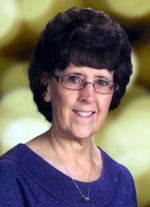 The story of one child offers a telling view of the care that Mary Briscoe gives to her first-grade students at Holy Family School in New Albany.
The story of one child offers a telling view of the care that Mary Briscoe gives to her first-grade students at Holy Family School in New Albany.
"She had been very successful in first grade, and she was shy and terribly afraid to go on to second grade," Briscoe recalls. "She cried because she didn't want to leave me. On one of the last days of summer vacation, I invited her to meet me in my classroom and help me get my room organized for the new first-graders. We talked and worked for an hour or so.
"When she was very comfortable, I took her next door and introduced her to her new teacher. She then helped her new teacher. After school started, I was available for hugs and pats on the back. I love my children and care for them as individuals."
It's no wonder that Briscoe notes, "Teaching is an adventure that will touch your heart in a way no other career can.
"I can't remember a time when I ever wanted any other career. Taking care of little ones and helping them learn has been as natural to me as breathing. I consider myself a facilitator, helping them to become self-motivated to be the best Christian and best citizen they can be."
Building the foundation
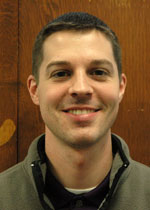 Even though he had few male teachers throughout his education, Stephen Buell could find his primary influence in becoming a teacher at home—his father.
Even though he had few male teachers throughout his education, Stephen Buell could find his primary influence in becoming a teacher at home—his father.
"When I was young, my father would be a substitute teacher occasionally," recalls Buell, a sixth-grade teacher at the consolidated St. Michael the Archangel and St. Gabriel the Archangel School in Indianapolis. "It made the thought of a male teacher commonplace."
As a teacher, Buell enjoys working in a career where hard work, creativity and important lessons blend. In a recent lesson focusing on Europe during medieval times, he taught his students about the Magna Carta, feudalism and the Crusades. The creative touch came when his students made models of famous castles from the era.
On a larger scale, Buell tries to build a foundation of knowledge, respect and honesty for his students. Two banners are prominent in his classroom. One reads, "Never settle for less than your best." The other states, "God gives us dreams a size too big so we can grow into them."
"I set the bar extremely high, and I do not shy away from those expectations," he says. "My class is a challenge, and I take pride in knowing that it is a challenge. Even though I expect quite a bit from students, I do also try to give compassion when dealing with the students. I may be the first male teacher that some students ever get. I try to be firm but sincere with all of the skills and life lessons I teach."
Living the faith
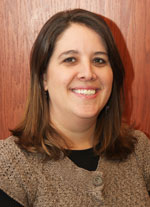 A Bible verse guides Lisa Vogel as she teaches eighth-grade students at St. Mary School in North Vernon:
A Bible verse guides Lisa Vogel as she teaches eighth-grade students at St. Mary School in North Vernon:
"Whoever welcomes one of these little children in my name welcomes me" (Mk 9:37).
"My main focus when teaching my students is to be a Christian by the love I show others," Vogel says. "I am always Catholic first. I embrace the unique characteristics of each individual and allow that to differentiate how I teach to the whole child."
It's all part of her goal to build long-term relationships with her students.
"As a result of 15 years of experience in teaching eighth grade, I have come to the realization that the most amazing strategies and techniques in the world do nothing when you have a 14-year-old who refuses to do the work," she says. "However, by taking the time to develop a mutual trust and respect for one another, I have helped many young people grow academically and spiritually."
Making that kind of difference is all Vogel has ever wanted to do.
"I was very blessed throughout my education to have had some amazing teachers that definitely influenced the type of teacher I have become. I think the greatest influence came from my parents and grandparents as they instilled in me a faith that has allowed me to be the catechist I am today."
Raising the bar
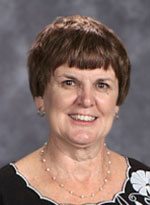 Vicki Auger tries to be open to new ideas with her second-grade students so she didn't flinch when one of the boys made a request as she did a science experiment.
Vicki Auger tries to be open to new ideas with her second-grade students so she didn't flinch when one of the boys made a request as she did a science experiment.
The boy said that he had a book of science experiments at home, and he wanted to do one in front of the class. Other children asked about presenting an experiment, too, and so began the weekly "I'm the Science Expert" lesson taught by a student or a group of students.
"Students were expected to present a copy of the experiment to me before presenting it to the class," says Auger, who teaches at St. Roch School in Indianapolis. "This showed students that I'm not the only 'teacher' in the class."
That trust and openness are at the heart of Auger's teaching style.
"My approach is to teach them that there is a solution to every problem, and that making mistakes is part of learning," she says. "Being willing to persevere when learning is difficult is also an important part of the process.
"Often, just getting students to know that I believe that they can learn is the first step. As they begin to gain confidence, I begin to raise the bar, and expect them to become more independent and responsible for their learning. They are always proud when they recognize how much they are capable of achieving."
Making the extra effort
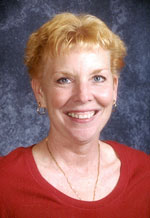 As a child, Patricia Musgrave learned two valuable lessons when her father practiced his teaching skills in front of his daughters at home.
As a child, Patricia Musgrave learned two valuable lessons when her father practiced his teaching skills in front of his daughters at home.
First, always have a positive attitude.
Second, make sure your teaching is driven by the needs of your students.
Those two goals have guided Musgrave in her 34 years as a special education teacher, including the past 19 years at Roncalli High School in Indianapolis.
"All students have the ability to learn the material," Musgrave says. "As a resource teacher, it is my responsibility to take the material that was taught in class and make sure the student understands it. If the student is struggling, I need to find a different way of presenting the material. It may be as simple as restating the material in a different manner or it can be more involved and require a completely different method."
Musgrave's faith drives her teaching.
"Part of the reason I left public education was that I felt I could benefit more students in a private school setting," she says. "I also made this decision so that I could bring my faith to work with me on a daily basis. I do this by sharing Mass, Communion services, service projects and having discussions on moral issues regularly." †
Related Stories:

 The story of one child offers a telling view of the care that Mary Briscoe gives to her first-grade students at
The story of one child offers a telling view of the care that Mary Briscoe gives to her first-grade students at  Even though he had few male teachers throughout his education, Stephen Buell could find his primary influence in becoming a teacher at home—his father.
Even though he had few male teachers throughout his education, Stephen Buell could find his primary influence in becoming a teacher at home—his father. A Bible verse guides Lisa Vogel as she teaches eighth-grade students at
A Bible verse guides Lisa Vogel as she teaches eighth-grade students at  Vicki Auger tries to be open to new ideas with her second-grade students so she didn't flinch when one of the boys made a request as she did a science experiment.
Vicki Auger tries to be open to new ideas with her second-grade students so she didn't flinch when one of the boys made a request as she did a science experiment. As a child, Patricia Musgrave learned two valuable lessons when her father practiced his teaching skills in front of his daughters at home.
As a child, Patricia Musgrave learned two valuable lessons when her father practiced his teaching skills in front of his daughters at home.